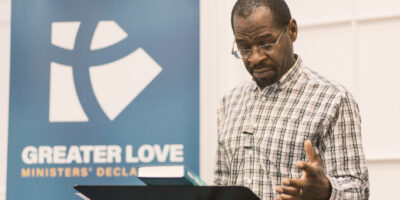Christ’s example – central to the Greater Love Declaration
An introduction to the Greater Love Declaration, by Revd Raymond Brown of East London Tabernacle Baptist, delivered at the Declaration’s official launch.
According to the good news of the Bible, even though Jesus Christ from the very beginning of all things was with God and indeed was and is God. Even though He is the Creator through whom all things were made, making Him the source of not only our physical life but also the source of all spiritual life and reality. Even though our Creator God in Jesus took on human flesh, blood, and bones; and remarkably dwelt among us 2000 years ago.
Even though our natural tendency is and has been to reject His light, preferring instead the darkness of our own foolish unbelief; he came into this world, not to be served (which would have been perfectly within His right) but rather, to serve us by giving us the right to become children of God. And that despite our wilful rebellion, rejection and indifference towards Him.
The life of Jesus Christ was marked first and foremost by self-denial and self-sacrifice.
The life of Jesus Christ was marked first and foremost by self-denial and self-sacrifice. Indeed, Jesus willingly denied Himself, took up His cross and died sacrificially to save each and every person here today. And the glorious, good news of the Bible, compares Jesus Christ to a loving husband who denies self, while giving of Himself sacrificially for the sake of His bride the church.
I remember a then colleague of mine some years ago, preaching a sermon on the latter part of Ephesians chapter 5. His basic premise was that marriage rightly understood is at the very heart of the universe. This is because Jesus dying for the sins of the world; while lovingly creating a people for Himself, is at the heart of God’s plan for this universe. It is into this context that we are to understand these wonderful words spoken by Jesus Christ in John’s gospel:
Greater love has no one than this, that someone lay down his life for his friends. (John 15:13)
The LORD Jesus Christ laid down His life for those who were His enemies, so that He might make them His friends. So at the heart of the Christian message stands the idea that earthly marriage is a permanent and ongoing witness to the eternal self-denying self-sacrificial love of Jesus Christ for people like you and me.
So not only has Jesus uniquely sacrificed Himself for us. In doing so He has also left us an example of how to live our lives. Therefore great blessings flows to all people everywhere of great faith or none when marriage is widely honoured. Or when the Christian attitude to marriage and sex is, as in all other things, not one that craves at all cost self-satisfaction or self-fulfilment for the sake of self, but rather pursues self-denial and self-sacrifice for the good of others. And as we bear true witness to our natural God given sex with all that this entails.
So not only has Jesus uniquely sacrificed Himself for us. In doing so He has also left us an example of how to live our lives.
Significantly this will mean abstaining from all sexual activity outside of marriage or being sexually exclusive or faithful within marriage. It will start by recognising marriage as the life-long or permanent covenant bond between one man and one woman. At the heart of which must be an attitude of self-denial and self-sacrifice. This is the reason for the clear and unambiguous commands of Holy Scripture around marriage, sex, and gender. And for the consistent, unchanging submission to this teaching by the Church across the world and down all the ages.
This is why we are calling ministers and pastoral workers in Christ’s church, to commit themselves among others things to the following: There are no circumstances – not the threat of legal sanction, nor of financial penalty, nor of social stigma – which will cause us to abandon our LORD’s call to love in this way, in sexual matters as in all others. And therefore there are no circumstances which will cause us to abandon the Christian doctrine of marriage, nor to cease teaching it, to all people of every age. If the cost to ourselves of faithfulness to our LORD, and love for those around us, is high, we nevertheless commit ourselves to these things. For in this way too, we recognise that we are called to lay down our lives for the good of others; for there is, as our LORD Jesus Christ said, no greater love than this.
Revd Raymond Brown, East London Tabernacle Baptist



